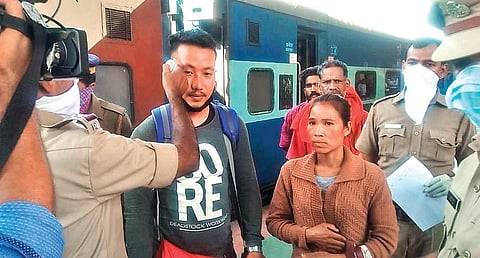

KOCHI: Life has not been the same for Dr Roy Kurian (name changed) since COVID-19 struck Kerala. While the rest of the world beat a hasty retreat to the safety of their homes, this 40-year-old medic and others of his ilk have kitted up to bravely combat the virus. Having been chosen for the onerous task of treating patients who have tested positive for the virus, Dr Kurian exudes quiet pride and complete confidence as he goes about his daily work.
Dr Kurien’s day at the hospital starts with rounds of the isolation ward at Ernakulam Medical College Hospital, Kalamassery, at 8am. Accompanied by his team comprising staff nurses, he carries out daily check-ups, recording and tracking the functioning of vitals of the patients admitted in the wards. “General medicine and paediatrics departments handle the COVID-19 cases reported here at the MCH. We all kit up in full Personal Protection Equipment (PPE) prior to entering the isolation wards. So far, we have not been faced with any serious infection of coronavirus, which is a good sign, but we cannot let our guard down even for a moment,” said Dr Kurian, who, along with two other doctors, is administering treatment to the three-year-old, the first COVID-19 positive patient in Kochi.
A nurse, an attender and a cleaning staff are always on duty at the isolation ward, which is set up in a three-storey block at the MCH, taking care of the patients’ needs. “The charge of the isolation ward is given to doctors by turn every week. The staff members also work in shifts, ensuring that there will always be a doctor on duty at night, with his team. The rest of us stay ready for on-call duty. If any emergency were to occur, we are just a call away, ready to reach the ward quickly. The day the child was brought to the hospital, I returned home at 3am,” said the doctor.
Dr Kurian travels almost 20km from his home up and down daily in his own car. Entering the car is a strict no-no for his family or friends.Since containing the spread of the virus is vital, the doctors and staff treating the patients take extra precautionary measures. “Though we wear complete protective gear while at the hospital, we take additional measures when we go back to our homes so that there is zero chance of us being inadvertent carriers of the virus. We use sanitisers and cleanse ourselves thoroughly before heading home. Even at home, I keep to a separate room, without interacting much with the rest of the family. They understand the need for caution, though deep inside we all are apprehensive,” said Dr Kurian.
“We used to leave the hospital by around 5pm earlier, but that has become a rarity now. I avoid dining with the family and spending time with the kids so that I do not put them at any risk, however small,” said Dr Kurian.
The nursing staff, attenders, and paramedics, who are straining themselves to treat the patients, have been given separate facilities to sanitise themselves before leaving the hospital.